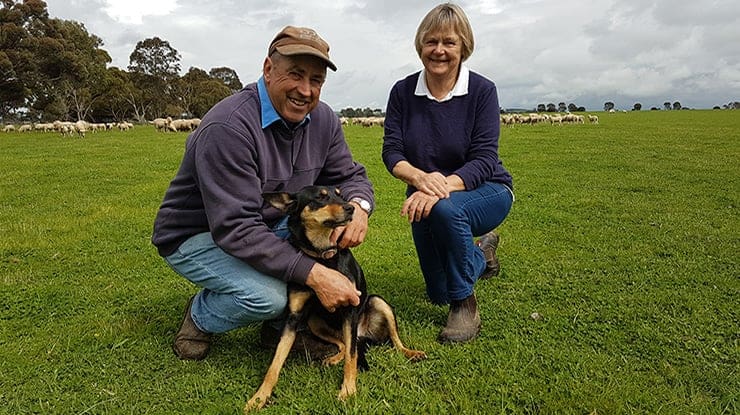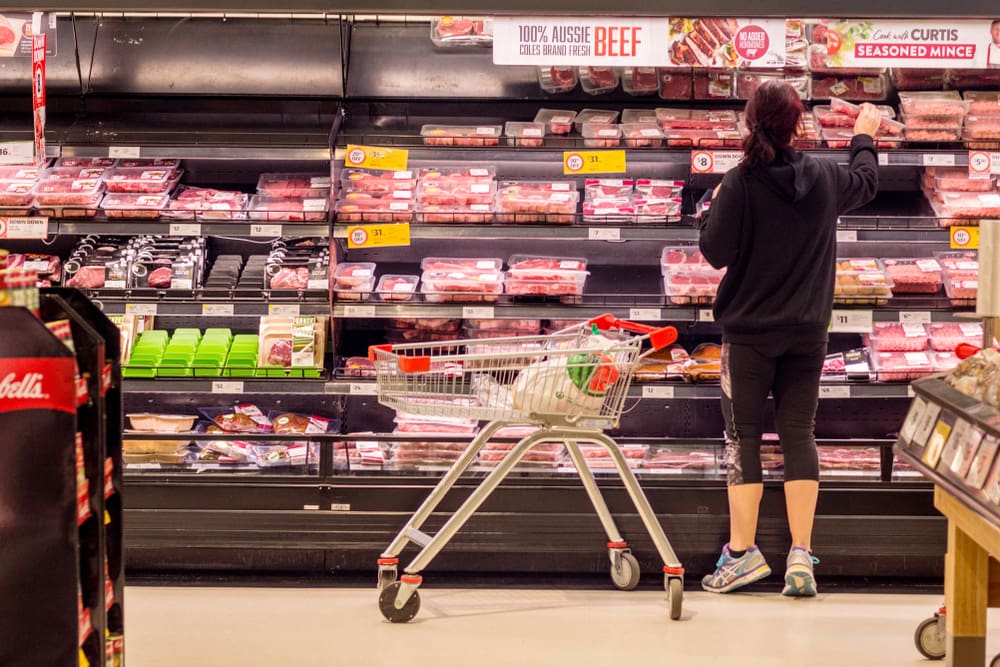SUBMISSIONS have opened for the latest Senate inquiry into supermarket prices, with Australia’s two biggest operators receiving a mix of a criticism and credit.
Led by The Greens, the Senate inquiry into the impact of market concentration on food prices and the pattern of pricing strategies was launched last year – and is now one of several inquiries into supermarket prices in an ACCC investigation.
While submissions have only recently opened, a handful of red meat industry participants have sent in their perspectives, with some clear themes emerging.
Victorian lamb producer praises Woolworths

Ararat lamb producers Charlie and Liz de Fegely. Image – MLA.
Ararat district lamb producer, CharIes de Fegely, a Woolworths supplier through its Greenstock division, said his operation has a great working relationship with the supermarket and it would be tragic to have any government intervention in controlling prices.
“It is not a “given right” to have our product on the supermarket shelf and the more we can do to ensure it stays on the supermarket shelves the greater viability for our business.
“I see our relationship with Greenstock and Woolworths as the key to our future,” Mr de Fegely said.
“It would be an absolute disaster if the outcome of this inquiry was to have government Intervention in price setting.
“The current model is not perfect, but we need to have the free market remain, which is influenced by “supply and demand”, he said.
“In the past, top performance has not been rewarded because supply has been tight but the model, we operate with rewards top production.
“The result is that there is a better product on the supermarket shelf for the consumer.”
Mr de Fegely said his western Victorian property will 10,000 lambs to Woolworths from October 2023 to April 2024.
“Woolworths is our main customer and we have over the past two years developed a favourable relationship.
“By continuing to work with Woolworths through the Greenstock group we aim to continually improve our lambs and management so that they meet the ever-increasing consumer demands,” he said.
“The prices we have received in the past two years would be the best that we could achieve in the industry if not better.
“The prices paid by both Coles and Woolworths are ahead of some of the other processors who have endeavoured to keep the prices down,” he said.
Mr de Fegely said he operated on a “spot price basis” and do not have contracts.
“In the past, I have witnessed very poor outcomes with contracts.
“Greenstock set tight specifications which we need to meet to ensure can deliver lambs to them,” he said.
“These specifications to supply are at a level that precludes a lot of lamb producers, but for us, it is worth making the extra effort.
“We are rewarded for meeting these specifications.”
AMIC pushes to alleviate other cost burdens
In lodging its submission, the Australian Meat Industry Council urged the Senate committee to gain an understanding about the complicated supply chains the industry operates under. AMIC represents processors, butchers and some small goods suppliers.
“Periods of divergence between what the producer earns and consumer pays is normal and based on market forces,” the submission said.
“However, if market forces are abandoned by the supermarkets when making retail pricing decision, this will unintentionally impact the independent local butchers who do not necessarily have those same options available.
“Business decisions also need to be understood in the short, medium and long term. For instance, a processor may seek to run at a loss when supply is short and livestock are expensive to maintain customers and their workforce, knowing that the cycle will eventually turn in the medium to long turn. Likewise, a butcher buying cattle form their local saleyard each week may be unwilling to pass on a sudden jump in the livestock price to consumers and may, instead, sell beet at a temporary loss or a lower margin.”
AMIC said governments could focus on cutting costs outside the price of livestock to ease the pressure on retail prices.
“The operating costs of businesses along the meat supply chain have grown in the last couple of years amidst broad inflationary pressures and ongoing workforce shortages,” the submission said.
“One clear way to make producers, consumers and the businesses in between better off is to focus on levers and policies that can alleviate the growing cost burden evident throughout the supply chain.”
Calls for more supply chain regulation
There has been calls for more regulation and transparency measures on the way supermarkets interact with the supply chain. Tasmanian Farmers says a series of measures, including an ombudsman, could be in place.
“The escalating profits of supermarkets, marked by a surge in essential item prices, call for robust monitoring and regulation mechanisms,” it said in its submission.
“Opportunistic pricing, marked-up costs, and misleading discounts necessitate enhanced regulatory oversight and transparent pricing policies. The proliferation of home brand products requires increased transparency, support for independent labels, and fair pricing agreements.”
The Australian Beef Association has called for a similar system to the United States, which has a series of regulations dedicated to the meat supply chain called the Packers and Stockyards Act.
“With this, the possibility for anybody to price gouge, would make it rather difficult and would come to the attention of the authorities,” the submission said.
“There is a strong industry belief that the American Packers and Stockyards Act should be further investigated.”
Woolworths suppliers defend supermarket’s conduct
While much of the public comment that led to the Senate inquiry was criticising the supermarkets, some Woolworths suppliers have specifically written to the inquiry to praise their relations with the company.
Glen Innes-based livestock agency Colin Say & Co said it had a good relationship with Woolworths over 20 years of dealing with the company.
“During the cattle market crash in October 2023 when saleyard prices were as low as $1.50-$1.80/kg Woolworths remained at $5.20 carcass weight, which was a great support to our producers during difficult seasonal and market conditions,” its submission said.
“Our local Woolworths buyers are transparent with us and we are in regular contact discussing any market changes. We have always found them to be fair, open and honest.”
Western Australian producer Richard Metcalfe has been supplying Woolworths with grass-fed beef for more than 25 years and in the last six months supplied 1710 head of cattle.
“We have always found them to be a very good business to work with. They abide by all industry protocols and are very prompt payers,” Mr Metcalfe said.
“Within the WA market, Woolworths is the price setter. All other players within the market wait until Woolworths sets its price and fall in behind, always at a lower level. In 2022 a lot of the market was $2.00/kg below Woolworths’ price. In 2023 Woolworths pricing was approximately $400.00 per head above the saleyard price.”
Mr Metcalfe said Governments represented a bigger threat to the WA industry than supermarkets.
“One of the main problems within the WA market is the policies of the current Federal Government. Many live sheep ships to the Middle east also carry a component of live cattle. This is one of the few sources of compete on to the supermarkets.”
Criticism for ditching in-store butchers
A common criticism of the supermarkets among the submissions has been the decision to abandon the in-store butcheries and rely on packaged product from a central location.
“Supermarkets have brought major change to the meat industry. For instance, they have closed their own butchering/meat packing rooms. This has cost the jobs of around 1200 butchers at Coles, reported by the ABC online 8 July 2021,” the ABA said.
The Australian Meat Industry Union also took the opportunity to highlight butcher shop closures.
“This was plainly a cost cutting measure in circumstances where Woolworths and Coles were already making significant profits in their meat departments,” the union said in its submission.
“The current practices are also more harmful to the environment through the creation and distribution of excess plastics, and with such an extensive monopolisation of meat products (and products generally), it will only serve to continue to put independent butchers further out of business (unless they can compete with the pricing & structure of the supermarkets).
“Unless steps are taken to decentralise production processes in favour of the customer, then the community will invariably suffer further in the quest for profit over people.”
Coles defends pricing at both of ends of supply chain
Coles is the first of the two supermarkets to make its written submission to the inquiry, highlighting its long-held relationships with producers and recent price reduction on red meat. Here are some of comments from its submission addressing the meat industry.
As recently as January 2024, we announced red meat promotions that were planned over many months and saw Coles Australian Lamb Loin Chops at their lowest price in four years, saving customers more than 25pc and savings on Coles Beef Sizzle Steak of 15pc, Coles Beef Rump Steak of 21pc, Coles Beef Porterhouse Steak of 22pc and Coles Beef Scotch Steak Fillet of 20pc.
Coles procures directly from over 2,500 producers across Australia. We are proud of the long-term relationships we have with these producers and processors, with many spanning decades. Coles purchases almost all its red meat directly from farmers. Less than 2% of our beef comes from saleyards. Coles buys feedlot and pasture raised cattle on forward contracts and we agree prices with our farmers at this time.
These contracts provide security of demand for our suppliers and security of supply for Coles and our customers. While livestock prices fluctuate, there are many other operational costs that impact the price consumers pay. Those costs, including transport, processing, packaging, labour and operating costs such as for refrigeration and energy, have gone up and remain high.
A key driver of supermarket price increases has been cost price increase requests from our suppliers and farmers. Coles received an average of over 70 requests per week from suppliers and farmers in FY22 and FY23 (almost double the level of FY21 requests).






HAVE YOUR SAY